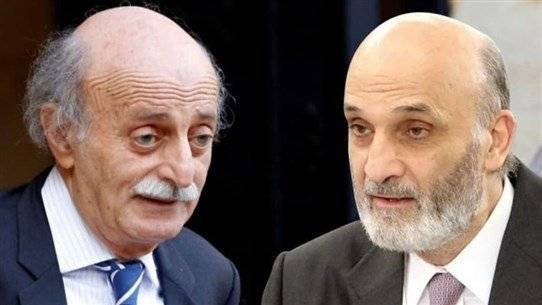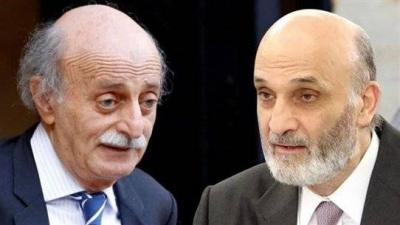A state of coolness currently dominates the relationship between the Lebanese Forces party and the Progressive Socialist Party, but it is unlikely to reach the stage of a break between two parties that share common grounds, even if they have differing approaches to the presidential election issue, according to sources following the relationship between the two parties. This current state of coolness, according to the same sources, does not stem from the Progressive's dialogue with Hezbollah, but rather from the statement issued by MP Strida Geagea in response to the stance of Progressive Party leader Walid Jumblatt, who refused to accuse the government commissioner at the military court, Judge Fadi Akiki, in light of the repercussions of the incident involving Bishop Moussa al-Haj upon his return from occupied Palestine to Lebanon via the Naqoura crossing.
The accompanying sources affirm that the coolness surrounding the relationship between the Progressive and the Forces does not necessarily mean that they are on the brink of achieving divorce papers in the political sense. They state to Asharq Al-Awsat that communication between the two parties has not ceased, albeit it has continued unofficially, as was the case the night before last; a phone call was registered from former Minister Melhem Riachi (Forces) to MP Wael Abu Faour (Progressive), which came just hours after the press conference held by Forces leader Samir Geagea, where he clarified his position on the presidential elections.
The sources point out that linking the coolness between the two parties to the resumption of dialogue between the Progressive and Hezbollah is misplaced, and the cost of this will not be dragging into a break with the Forces, as the commonalities they share are far greater local and strategic agreements on key issues that remain suspended than the differences in their approaches to the presidential election. They believe that the difference between the two parties regarding the presidential election will not come at the expense of their shared goal of refusing to elect a new president belonging to the 8 March coalition and who operates in the sphere of the resistance axis led by Iran, whose top ally in Beirut is Hezbollah.
The same sources consider that Jumblatt, during his reception of a Hezbollah delegation, was clear in his rejection of electing a president affiliated with 8 March and emphasized the need to bring in a president who does not pose a challenge to anyone, but rather is completely contrary to the current president Michel Aoun, whom Jumblatt holds responsible for the collapse of the country and the destruction of its relations with Arab countries, as well as instigating political skirmishes with major political forces, including some of Hezbollah's allies, referring to his clashes with Speaker of the House Nabih Berri.
They add that Jumblatt, in resuming his dialogue with Hezbollah, is not looking to strike a bilateral deal with them, but rather to emphasize the necessity of creating a political shock to avoid extending Aoun's term by electing a similar figure, as the country can no longer endure further catastrophic collapses.
They affirm that Jumblatt will not gamble on his Arab relations in exchange for entering into a bilateral deal with Hezbollah or adopting a stance in the presidential elections that contradicts the popular mood within the Progressive and the general mood in the country. They see no justification for passing judgments on intentions as long as the dialogue is taking place under the roof of "conflict regulation and organizing differences."
They reveal that the Progressive's communication with Arab countries has not ceased, but there is nothing preventing communication with a key component in the country represented by Hezbollah. They state that there is no objection to the goal that Geagea has set of blocking the way to the election of a candidate from 8 March to the presidency, but rather with the phrases he used, especially regarding his accusation of MPs, whether they are independents or affiliated with transformative forces in the parliament, should they not align with him in his stance.
The same sources continue that they do not oppose the need to raise the ceiling as an entry point for negotiations, but in a manner insulated from the challenge, and engage realistically with the presidential entitlement, as the majorities in parliament have not yet arrived at formulating a unified position. "Thus, we must give them the opportunity to unify their vision so that we can build on what is required... and then for each incident its news."
While sources dismiss the rumors some have been promoting regarding the potential meeting between the Forces and Change Movement leader MP Gibran Bassil regarding the presidential file from a position of disagreement, they confirm, on the other hand, that Bassil is promoting himself as a natural candidate for the presidency, and if this proves difficult for him, he sees no objection to being the mandatory passage for the election of the president, as he has yet to convince himself that he is out of the race for the presidency.
They believe that Geagea's description of the catastrophic situation that the country is grappling with forms a point of convergence with the Progressive, which opens the door for renewed communication between the two parties once the level of tension that caused its severance is eased, without reaching, by a decisive decision from both parties, a point of rupture. They state that there is a need to coordinate with independent MPs and their colleagues in transformative forces to block the way to an 8 March candidate reaching the presidency, and that is what brings together the Progressive and the Forces, despite their differing approaches to the presidential file.
Thus, the election of a new president will be a matter of international interest starting from early September, not only due to the insistence on holding elections on time but also due to the international and regional intersection's role in creating favorable conditions to prevent the country from falling into a deadly vacuum if it is decided to postpone it past the constitutional deadline for electing a president.
In this context, prominent political sources say that the period leading up to the start of international movements in September to create an atmosphere conducive to the natural birth of the upcoming president will witness an exchange of political campaigns aimed at undermining this or that candidate, although the candidates themselves are still holding their breath and will not take any action before the relevant countries initiate their engines towards the internal parties influential in the election process.
These political sources expressed surprise at the rumors that spread claiming that the French ambassador to Lebanon, Anne Grillo, before leaving for Paris for her summer vacation, had consulted Maronite Patriarch Bechara al-Rahi about a list containing the names of four presidential candidates and that the latter added a fifth name. They told Asharq Al-Awsat that such information is untrue, similar to previous claims that Rahi submitted a list of four candidates to the Vatican. They pointed out that Rahi has not intervened so far in the naming game and maintains his position of outlining the specifications of the president.
They stated that Bkerke does not intend to invite those who present themselves as strong candidates for a meeting to be held under the patriarch's auspices, or for another meeting limited to Bassil and Geagea, noting that the latter "has made his stance clear against his bitter rival (Bassil)... and that’s the end of the story."
The sources affirmed that Rahi will not repeat the experience of inviting strong candidates for a meeting at Bkerke as he did previously with President Amin Gemayel, Aoun, Geagea, and Sleiman Franjieh, even though that meeting was at their request. They stated that the theory of "a strong president within his sect" as one of the specifications of the presidency "has completely fallen, as the strong president is the one who unites the Lebanese rather than divides them, and who is capable of rising above political divisions and alignments, preventing Lebanon from being attached to a specific axis."
Therefore, dialogue contributes to saving the country, and, as the sources say, there is a necessity for everyone to come together during times of heightened crises. Consequently, there is no avoiding reviving communication between the Forces and the Progressive, which "will not be singing alone" in the presidential file, according to the same sources.




